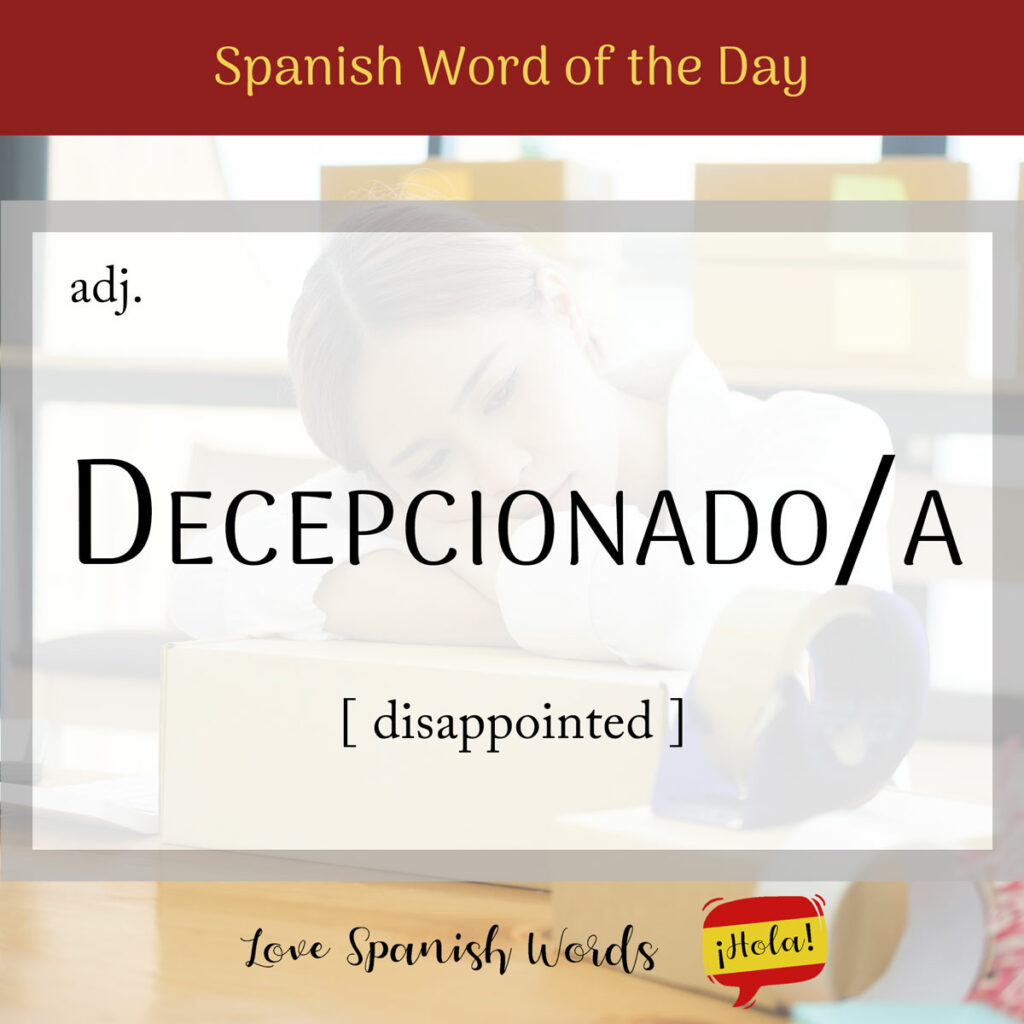The word decepcionado / decepcionada derives from the Latin verb deceptio, which means to deceive or fraud. The Spanish verb for deceptio is decepcionar (to disappoint). When the suffix -ado is added to a base word, it means an action is happening. In this word, the person is feeling disappointed.
Latin American Pronunciation
European Pronunciation

Decepcionado is an adjective used according to the gender of the person described. This means that for a feminine subject, you would need to change it to decepcionada. Their respective plural forms are decepcionados and decepcionadas.
The word decepcionado can be used in several contexts to describe a negative emotional state, usually caused by dissatisfaction about something.
When used personally, it describes feeling upset because something didn’t turn out as hoped or feeling disappointed when someone lets you down.
- Me siento desepcionada de él por su deshonestidad. (I feel disappointed in him for his dishonesty.)
- Estoy decepcionado de mí mismo por no lograr mi objetivo. (I feel disappointed in myself for not achieving my goal.)
Me siento decepcionada porque no aprobé el examen de inglés.
I feel disappointed because I didn’t pass the English exam.
Professionally, decepcionado can be used when referring to work results that didn’t turn out as expected such as a project not being completed on time or a contract falling through.
- El jefe está decepcionado con los resultados del proyecto. (The boss is disappointed about the results of the project.)
- Nuestros clientes quedaron decepcionados porque no pudimos encontrarles la casa de sus sueños. (Our clients were disappointed we couldn’t find them the house of their dreams.)
Los trabajadores están decepcionados porque sus salarios no aumentaron como se había prometido.
The workers are disappointed because their salaries were not increased as promised.
Decepcionado can also communicate disappointment towards a public event or action or a public figure.
- Los fans estaban decepcionados con el concierto. (The fans were disappointed with the concert.)
- Los manifestantes están decepcionados por la nueva ley aprobada por el gobierno. (The protesters are upset at the new law the government passed.)
You can also use the word to convey the feelings of a book for film character.
- El protagonista abandonó su ciudad tras sentirse decepcionado por la traición de su pareja. (The protagonist left his city after feeling disappointed by his partner’s betrayal.)
Some words related to decepcionado/a are:
- decepcionar = to disappoint
- decepción = dissapointment
- decepcionante = disappointing
Es decepcionante que mi mejor amiga no haya podido asistir a mi boda.
It’s disappointing that my best friend couldn’t attend my wedding.
Synonyms for this word are desilusionado (disillusioned), defraudado (dissapointed), desencantado (disenchanted), frustrado (frustrated), insatisfecho (disatisfied), and desesperanzado (hopeless).
Antonyms for decepcionado are satisfecho (satisfied), contento (content), feliz (happy), entusiasmado (enthusiastic), ilusionado (excited), and esperanzado (hopeful).

Spanish idioms and metaphors featuring ‘decepcionado’
Various phrases, sayings, idioms, and slang words express feeling decepcionado. These phrases don’t use the word directly but express the same sentiment. Here are a few:
A popular phrase is Me siento como un niño al que le han quitado su juguete favorito. The translation is, I feel like a child who has had his favourite toy taken away. The phrase metaphorically expresses feeling similar to a young upset child.
Another phrase is Esto es un balde de agua fría. (This is a bucket of cold water.) It expresses disappointment towards a negative surprise that suddenly happens.
One idiom is tener el corazón roto (to have a broken heart). It describes experiencing a big disappointment in a romantic context.
No era oro todo lo que relucía (All that glittered was not gold) is another popular phrase that conveys disappointment. It is used when something that had potential results in a letdown.
As for slang related to feeling decepcionado, a popular expression is Me dejó colgado (He/she left me hanging). This slang describes someone not meeting your expectations and disappointing you because they abandoned you.
Me bajoneó is informal and in English it means he/she got me down. It expresses being disappointed because someone caused you to be sad.

